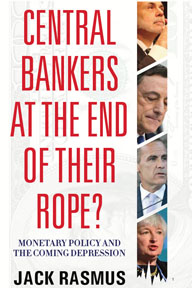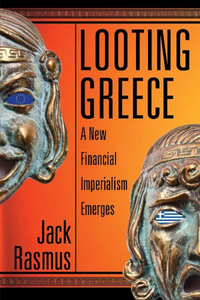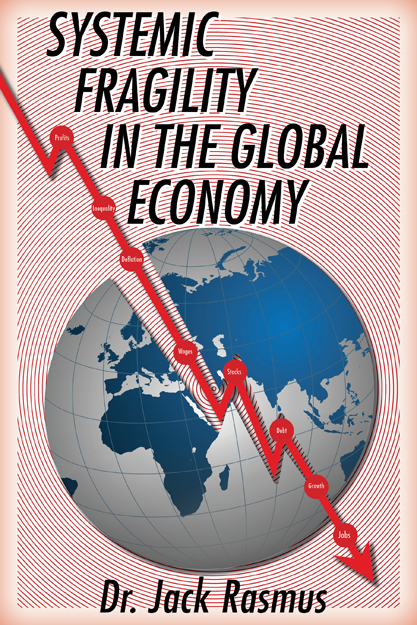If your answer to the above is ‘yes’, then I welcome you to consider joining me and those participating online in a course I have agreed to teach for the newly formed progressive ‘Z School’ collective. The school, and my class, starts April 4, but you can join through next wednesday. This is an online, 8 week class. The description of the content of the 8 weeks is indicated below. Cost for the course range from $100 for full enrollment; $60 for low income enrollment; and $30 for observer. As instructor, I post my interpretations and the readings online, and I and students engage in a forum on fridays online, and a chat session on sundays online.
For more information and enrollment instructions, go to the Z school webpage at:
https://zcomm.org/zschool/moodle/
There you will find a description of my particular course, ‘Finance Capital in the 21st Century’, as well as other courses starting next week in this new Z school, progressive-radical initiative, taught by seasoned activists worldwide:
The 8 Week Topics for my Course are as follows:
Week/Topic #1: Marx on 19th Century Finance Capital
How has Finance Capital changed from the 19th to the 21st century? What is the role of financial instability historically in precipitating banking crashes and economic depressions? Why are most contemporary analyses of ‘financialization’–both left progressive, Marxist, and bourgeois economist–wrong? What are the prospects of another global financial crash in the next ten years, followed by a more serious economic depression ‘next time’? These are the main themes of this course. In the first four weeks, in order to answer these questions, this course will explore the views of the best economists on the subject of finance capital. In the second four weeks, the course will look at actual financial crashes and instability events since the early 1990s, as well as brewing today again, including in Japan, China, Europe, and USA.
Week 1 begins with a review of key chapters of Marx’s unpublished vol. 3 of Capital (read chapters 24-27; 30-31 recommended) on capitalist finance and credit in the mid-19th century.
A link to a free online source of these chapters is: https://www.marxists.org/archive/marx/works/1894-c3/index.htm
The instructor, Jack Rasmus, will also provide a powerpoint summary of the main topics for the first (and remaining seven) class sessions, a week before each of the seven classes. Jack will reply to comments by students in the ‘open forum’ every friday, 1-2 pm pacific time. Real time chat discussions will then be held on Sunday, 11am-12n,for students to ask questions online of Rasmus.
Week/Topic #2: Keynes & Fisher: Finance Capital 1930s
How had Finance Capital changed by the early 20th century? What was its role in precipitating the Great Depression of the 1930s? Who were the professional speculators and how had the escalation of debt in the 1920s and financial speculation led to the stock market crash of 1929, and thereafter to four consecutive banking crashes in the early 1930s?
Keynes’ key chapter 12 of his General Theory, on the role of professional financial speculators in capitalist economies will be read and discussed. As well, will Keynes’ contemporary, Irving Fisher, and his article on the role of debt and price deflation in depressions, ‘The Debt-Deflation Theory of Depressions’. These readings will be posted here on Moodle a week prior to week 2 of the course.
The instructor, Jack Rasmus, will also provide a powerpoint summary of the main topics for the first (and remaining seven) class sessions, a week before each of the seven classes. Jack will reply to comments by students in the ‘open forum’ every friday, 1-2 pm pacific time. Real time chat discussions will then be held on Sunday, 11am-12n,for students to ask questions online of Rasmus.
Week/Topic #3: Minsky & Rasmus: Finance Capital 1970-2000
The progressive return of financial instability in the global capitalist system in the 1970s and after will be the topic, as well as the views of the chronicler of this return, economist Hyman Minsky. How the rise of finance capital from the ashes of the great depression and post-1945 period occurred, and what were the consequences in the 1970s, 1980s, and early 1990s when Minsky wrote of it. Why Minsky believed financial instability was the intrinsic nature of Capitalism. What Minsky did not see coming.
Minsky’s seminal articles, ‘The Financial Instability Hypothesis’, and selections from his book, ‘Stabilizing an Unstable Economy’ will be posted here on Moodle, to read and discuss. Select chapters from Jack Rasmus’s 2010 book, ‘Epic Recession: Prelude to Global Depression’ will be posted for reading, as will a powerpoint by Rasmus summarizing key points from Minsky and himself for discussion.
The instructor, Jack Rasmus, will also provide a powerpoint summary of the main topics for the first (and remaining seven) class sessions, a week before each of the seven classes. Jack will reply to comments by students in the ‘open forum’ every friday, 1-2 pm pacific time. Real time chat discussions will then be held on Sunday, 11am-12n,for students to ask questions online of Rasmus.
Week/Topic #4: Shadow Banks & New Finance Capital Elites
How Finance Capitalism, and the ranks of the global Finance Capital elite have evolved and changed in the last two decades is the topic of this fourth week’s class. What are shadow banks and how are they destabilizing global capitalism? what is the role of debt, leverage, securitization, derivatives, the global liquidity explosion, technology, neoliberal capitalist central bank policies, inside credit, fiscal austerity, competitive currency devaluations, deflation, declining real investment, labor market ‘reform’, and other important developments to understanding the evolution of 21st century Finance Capital? Why is the global capitalist system becoming more financially unstable?
Readings will be posted on Moodle on ‘what is shadow banking’, the scope and magnitude of global debt, and other relevant readings.
The instructor, Jack Rasmus, will also provide a powerpoint summary of the main topics for the first (and remaining seven) class sessions, a week before each of the seven classes. Jack will reply to comments by students in the ‘open forum’ every friday, 1-2 pm pacific time. Real time chat discussions will then be held on Sunday, 11am-12n,for students to ask questions online of Rasmus.
Week/Topic #5: Financial Crises in the 1990s
In weeks 5 through 8 of the course, attention turns to focus on actual financial crashes and their aftermath. Week 5 focuses on the growing frequency, scope and severity of financial instability in the 1990s. Japan’s great crash of 1990-91 and perpetual recession that followed; the USA savings and loan bust of 1990 and recession; Mexico’s ‘Tequila Crisis’; the Asian Meltdown of 1997-99; and the USA ‘dot.com’ bust of 2000.
Select, short readings on each of these events will be posted on Moodle.
The instructor, Jack Rasmus, will also provide a powerpoint summary of the main topics for the first (and remaining seven) class sessions, a week before each of the seven classes. Jack will reply to comments by students in the ‘open forum’ every friday, 1-2 pm pacific time. Real time chat discussions will then be held on Sunday, 11am-12n,for students to ask questions online of Rasmus.
Week/Topic #6: The Crash of 2008-09 & Epic Recessions
Continuing the focus on actual financial crashes and consequences, week #6 investigates the causes and consequences of the great banking crash of 2008-09. The role of financial speculation and shadow banking in the crash, the failure of banking regulation that followed, and the failure of central bank QEs and government fiscal austerity policies to generate full recovery.
Select chapters from the instructor, Jack Rasmus’s, works and other critical analyses of the 2008-09 crash and the recessions that followed, 2010-15, will be posted on Moodle a week prior to class.
The instructor, Jack Rasmus, will also provide a powerpoint summary of the main topics for the first (and remaining seven) class sessions, a week before each of the seven classes. Jack will reply to comments by students in the ‘open forum’ every friday, 1-2 pm pacific time. Real time chat discussions will then be held on Sunday, 11am-12n,for students to ask questions online of Rasmus.
Week/Topic #7: Financial Instability: China & Europe Today
The growing role of shadow banks, financial asset bubbles, rising government-corporate debt, failure of central banks and government policies to check the rising financial instability and slowing economies in China and Europe are the topic of this 7th class. Growing instability in the BRICS and other emerging markets. Is a new phase of global financial instability emerging, with a focus on China and Europe? Based on the theories of writers thus far reviewed, and the prior experiences of financial crashes in both the remote and recent past, what does it all mean today?
The instructor will post select readings on Moodle, including from the global business press and global capitalist financial institutions (BIS, IMF, McKinsey Research, etc.) on financial instability in China and Europe today.
The instructor, Jack Rasmus, will also provide a powerpoint summary of the main topics for the first (and remaining seven) class sessions, a week before each of the seven classes. Jack will reply to comments by students in the ‘open forum’ every friday, 1-2 pm pacific time. Real time chat discussions will then be held on Sunday, 11am-12n,for students to ask questions online of Rasmus.suggest evidence of forces behind a new financial crisis are building in the global economy, especially in China and Europe today.
Week/Topic #8: Financial Instability in the USA: 2010-2020
In this final class, the focus turns to the USA economy in 2015. Is the US economy really ‘exceptional’? On a path to growth and stability, real and financial, while the rest of the world grows more financially unstable and slips into more recessions everywhere? This class examines the claim of American economic exceptionalism and debunks the argument. Sources of growing influence of shadow banks and the new finance capital elite are identified and discussed. Forces of financial instability growing behind the scenes are noted. Possible scenarios, near and future, of increased financial instability are proposed. Why the USA may be on the eve of another financial crises and even deeper downturn than that following 2008-09.
The class will discuss the USA scenarios, and the conditions in China, Europe, the growing crises in emerging markets, the global oil price collapse, in light of both the theoretic views of Marx, Keynes, Minsky, Rasmus and others, as well as the historical examples of financial crashes of the past two decades. The general topic of how has Finance Capital changed today? Is it a dominant force in the 21st century, and a fundamentally destabilizing fact that threatens the global capitalist economy itself?
A draft selection from Jack Rasmus’s forthcoming June 25-26 public presentation in Spain, ‘A Theory of Systemic Fragility in the 21st Century Global Economy’, will be posted as reading on Moodle.
The instructor, Jack Rasmus, will also provide a word or powerpoint summary of the main topics for the first (and remaining seven) class sessions, a week before each of the seven classes. Jack will reply to comments by students in the ‘open forum’ every friday, 1-2 pm pacific time. Real time chat discussions will then be held on Sunday, 11am-12n,for students to ask questions online of Rasmus.
 Dr. Jack Rasmus @drjackrasmus
Dr. Jack Rasmus @drjackrasmus









Leave a comment